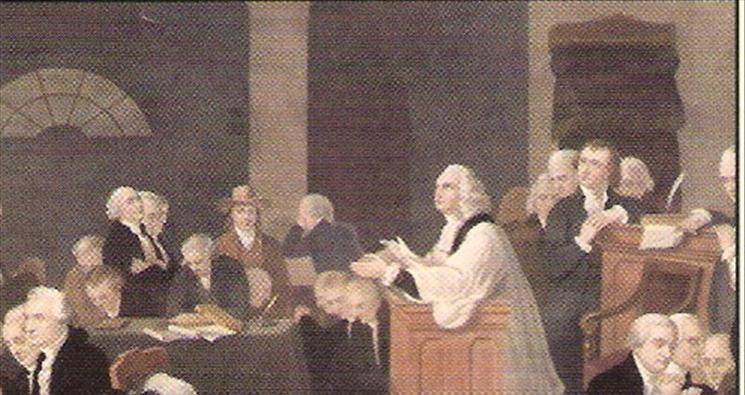Religious Freedom is About Actions Not Words
Today, January 16th, is national Religious Freedom Day. Like many of his predecessors before him, President Obama issued the obligatory proclamation.
But are we, as a nation in general and this Administration specifically, really protecting religious liberty?
It was on this day in 1786 that the Virginia Statute for Religious Freedom was enacted. It was this Virginia statute, authored by Thomas Jefferson, that became the basis of our First Amendment religious freedom protections (a fact that I and every other Virginian you will meet are very proud of).
President Obama’s proclamation explains:
In 1786, the Virginia General Assembly affirmed an ideal that has long been central to the American journey. The Virginia Statute for Religious Freedom, penned by Thomas Jefferson, declared religious liberty a natural right and any attempt to subvert it "a departure from the plan of the Holy Author of our religion, who being Lord both of body and mind, yet chose not to propagate it by coercions on either." The Statute inspired religious liberty protections in the First Amendment, which has stood for almost two and a quarter centuries.
Despite the fact that President Obama allocates far more space talking about those who have no faith (“America embraces people of all faiths and of no faith,” “atheists and agnostics,” “what binds us as one is not the tenets of our faiths,” etc.) than protecting religious liberty, the fact remains that this President is all talk and no action when it comes to protecting our First Freedom.
President Obama states:
America proudly stands with people of every nation who seek to think, believe, and practice their faiths as they choose. In the years to come, my Administration will remain committed to promoting religious freedom, both at home and across the globe. We urge every country to recognize religious freedom as both a universal right and a key to a stable, prosperous, and peaceful future.
Nice words on paper, but what are we doing? Being “committed to promoting religious freedom” is judged by an administration’s actions, not its words.
Where has this Administration been for a U.S. citizen – a pastor from Boise, Idaho – who is being tormented and imprisoned in Iran, not for breaking a law but for being a Christian and gathering with others to practice his faith?
Did the Obama Administration make him a priority when it sat across the table from Iran? No. Did it even mention Pastor Saeed in that discussion? No.
In fact, while an overwhelming bipartisan majority in the Senate are demanding new sanctions on Iran, in part for its unjust treatment of Pastor Saeed and deplorable human rights record, President Obama has led the charge against them – led the charge against an effort that would in fact defend religious liberty.
But it’s not just with Pastor Saeed. When Egypt’s Christians were being increasingly persecuted, what did President Obama do? He sided with the Muslim Brotherhood. In Syria too his Administration sided with jihadists as Christian villages were attacked.
And where is the protection for people of faith forced to pay for abortion pills?
Ironically, a White House blog post today celebrates one major law being used by the government to protect religious liberty, RUILPA. What it fails to mention is RUILPA’s companion legislation, the Religious Freedom Restoration Act or RFRA. (Without getting too far into the weeds, RUILPA or the Religious Land Use and Institutionalized Persons Act was passed to supplement the protections in RFRA.)
RFRA, along with the First Amendment, is the main law being used to challenge the HHS Mandate. It’s sadly ironic that the Obama White House would attempt to appear as a champion for religious freedom, as its lawyers are in courts all across the country and now at the Supreme Court arguing that that religious liberty protections found in our Constitution and RFRA don’t really mean what they say they mean. Instead President Obama’s lawyers argue that forcing abortion pill coverage on someone doesn’t violate any real religious beliefs, and even it did, that abortion pill coverage is far more important than one’s faith.
That is not a commitment to religious liberty. It’s a commitment to champion a radical pro-abortion agenda.
As we celebrate our First Freedom today, let us resolve to not just talk about religious liberty, but together, take action to defend religious liberty. At the ACLJ, that is what we do, every hour of every day.
1.17.2014 Update: On national Religious Freedom Day, the White House once again proved that it is all talk and no action on religious freedom. In responding to a question about Pastor Saeed’s wrongful imprisonment in Iran, White House Press Secretary Jay Carney stated:
[W]e are appealing to the Iranian government when it comes to those who are being held, and we have -- and I have raised it frequently from this podium. And we continue to do that.
Broadly, we aggressively support religious freedom around the world and make clear our opposition to policies in countries that restrict religious freedom. And that’s a broad, comprehensive effort. But specifically on the issue of those being held in Iran on these related matters, as you've heard me, if you've been here, raise this in the past -- and we've noted that we bring these issues up all the time and press Iran on them -- we're going to continue to do that.
What has the Obama Administration done for Pastor Saeed; “raised it frequently from this podium.” And that’s it.
